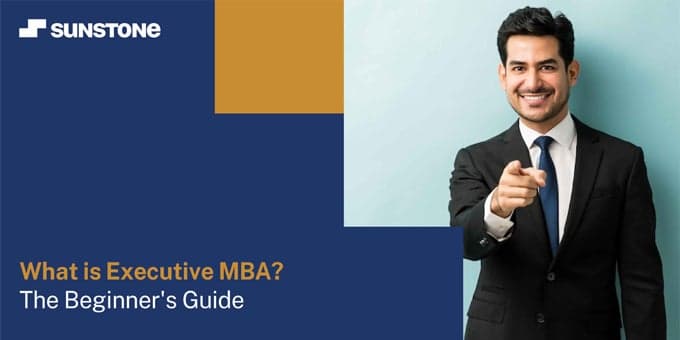5800 students unlocked their dream jobs with UG/PG programs in top colleges. Apply Now!
An Overview
If you're wondering about the Executive MBA meaning, here's everything you need to know.
Executive MBA is the complete form of EMBA. It is a postgraduate corporate degree with 2 years of Executive MBA duration. Its curriculum is similar to a traditional MBA course.
The primary distinction is that an executive MBA degree is intended to educate and advance the careers of managers, entrepreneurs, executives, and other business professionals.
Most EMBA programmes include students' professional experience and skills in the curriculum. Typically, the curriculum takes one to two years to complete.
Candidates develop new skills and enhance their analytical talents throughout this year by combining coursework with day-to-day working experience.
The entry fee for EMBA programmes is more than the admission fee for standard MBA programmes; however, in most situations, the employer gives financial support to its employees for completing an Executive MBA.
Executive MBA in India has gained wide popularity in recent years, and several top B-schools are now hiring EMBA graduates.
What are the types of Executive MBA?
EMBA can be categorised into the following three types:
- Executive MBA
- Online Executive MBA
- Specialist Executive MBA
-
Executive MBA
The traditional EMBA program is best suited for those with a highly busy schedule or working management professionals. It often combines online classes with face-to-face interactions, and the courses are offered during weekends, evenings, or intensive study periods.
-
Online Executive MBA
The Online Executive MBA course provides much more flexibility to students, allowing them to attend classes remotely from any part of the world. However, it may also include a residential aspect, where specific portions of the EMBA program are taught in person.
-
Specialist Executive MBA
The Specialist Executive MBA programs offer specialisms in different institutions like international business, healthcare, and sustainability.
Executive MBA Eligibility Criteria
To pursue an EMBA course, candidates must meet the following qualifying requirements:
- Candidates should have between 2 and 5 years of professional experience.
- A bachelor's degree from a renowned university with at least 50% aggregate or comparable CGPA is required.
- Some institutes may also require an average GMAT score.
- Candidates must be over the age of 27 at the time of application.
Executive MBA Job Opportunities and Top Companies
Aspirants who complete an EMBA can find attractive career prospects in large corporations in India and internationally.
They will also have a better chance of moving up the corporate ladder faster. They can also create their own business, which aids in the development of an international network of personal and professional contacts.
Human resource professionals, finance professionals and even product managers are taking this course to gain an advantage over their peers.
EMBA Management Entrance Exams
The table below lists the top EMBA course entry tests.
|
Best Executive MBA in India - Exams |
|
|
CAT |
GMAT |
|
XAT |
EMAT |
|
NMAT by GMAC |
CMAT |
Executive MBA Curriculum
The Executive MBA syllabus includes core and elective subjects. The EMBA curriculum is identical to the conventional MBA programme; however, many topics are more in-depth in the executive MBA programme.
The following is the executive MBA curriculum:
|
Executive MBA syllabus |
|
|
Corporate Finance |
Corporate Governance & Ethics |
|
Managerial Economics |
Business Law |
|
Decision Sciences |
Entrepreneurial Management |
|
Corporate Finance |
Managing People & Performance in Organisations |
|
Macroeconomics |
Competition and Strategy |
|
Designing Organisations |
Marketing Management |
|
Operations Management |
Financial Reporting and Analysis |
Executive MBA Elective Courses
The elective courses taken in the executive-mba programme are listed in the table below.
|
Elective Courses of Executive MBA |
|
|
Entrepreneurial Learning |
Decision Sciences and Information systems |
|
Corporate Strategy and Policy |
Economics and Social Sciences |
|
Production and Operations Management |
Marketing |
|
Organisational Behaviour and Human Resources Management |
Finance and Accounting |
Top Jobs for Executive MBAs
The following table lists the top jobs for Executive MBA graduates.
|
Executive MBA jobs |
Average salary per annum (Rs in lakh) |
|
Chief Executive Officer |
30 |
|
Chief Financial Officer |
13 |
|
Marketing Director |
26 |
|
Chief Operating Officer |
14 |
|
Operations Manager |
7.8 |
|
Product Development Manager |
15 |
|
HR Director |
29 |
|
Digital Marketing Manager |
5 |
|
Project Manager |
13 |
|
Telecommunications Manager |
8.6 |
|
Infrastructure Manager |
11 |
|
International Business Manager |
10 |
|
Energy & Environment Manager |
6 |
|
Import & Export Manager |
6 |
|
IT & Systems Manager |
7 |
|
Healthcare & Hospital Manager |
4.8 |
|
Supply Chain Manager |
8.5 |
|
Public Relations Manager |
6.2 |
Wrapping Up
Sunstone is a major higher education services provider that collaborates with academic institutions to improve students' employability-related skills and competencies.
At more than 40 educational institutions and in more than 30 cities, Sunstone provides undergraduate and postgraduate students with career-focused training interventions. Relevant industries recognise training programmes offered by Sunstone as effective ways to increase employability.
These programmes are intended for hybrid delivery and place an unprecedented emphasis on the development of both soft skills and personality traits. So, make sure you check out our Sunstone MBA programmes for better career opportunities.
FAQ - Executive MBA
-
What is the difference between an MBA course and an executive MBA?
The most significant distinction between MBA and Executive MBA programmes is that MBA students leave their employment, whereas EMBA students continue to work during the programme. As a result, Executive MBA programmes are typically held at night or on weekends to accommodate a typical business schedule.
-
Is it useful to do an executive MBA?
An EMBA is an excellent approach to establishing a professional network of peers for life with student peers and Alumni. Inside and outside the classroom, the best EMBA programmes provide numerous opportunities for students to network with current students and alumni.
-
What is meant by executive MBA?
An executive MBA programme, also known as an EMBA, allows executives to get their degrees while continuing to work in their current positions. Before beginning the programme, most EMBA students are relatively senior in their areas and have extensive job experience.
-
What are the benefits of an MBA?
There are multiple benefits of an MBA. Graduates of part-time or full-time Executive MBA programmes are more likely to occupy high-level management positions and have successful MBA careers. Over half of all MBA graduates worldwide work as senior managers or on boards of directors. This type of work comes with better compensation but also more duties.
-
What is the key difference between Executive MBA and Executive MBA distance learning?
Executive MBA caters to the requirements of working professionals who wish to balance their full-time job with education. The syllabus is nearly identical to a full-time MBA program; however, it's conducted outside normal business hours.
A distance MBA is an online Executive MBA distance learning program that provides additional flexibility to students who wish to get a part-time MBA degree without travelling to the campus.
HELP
Take the first step towards your dream job.
ABOUT THE AUTHOR


